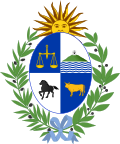History
Ukrainian immigration to Uruguay began in the early 20th century, with individuals arriving from Volhynia, Polesia, Bukovina, and eastern Galicia, including the Zakarpattia Oblast. [2] While most settled primarily in Montevideo, a small number were part of the largely ethnic Russian contingent that founded the town of San Javier. [3]
On December 26, 1991, Uruguay recognized Ukraine's independence after the dissolution of the Soviet Union. [4] On May 18, 1992, the two countries established diplomatic relations, and in the subsequent years, the parliaments of both nations approved the creation of parliamentary friendship groups. [5] In February 2022, in the context of the Russo-Ukrainian crisis, the Uruguayan government expressed concern over Russia's recognition of the separatist regions of Donetsk and Luhansk, and aligned itself with United Nations Security Council Resolution 2202 for the implementation of the Minsk agreements, seeking a "peaceful and lasting solution to the conflict". [6] Following the Russian invasion at the end of February, the Uruguayan government took a stance in favor of Ukraine, stating that the principles of the United Nations Charter had been "notoriously violated". [7]
Throughout the war, Uruguay has taken a stance in favor of Ukraine's territorial sovereignty in the voting of resolutions at the United Nations General Assembly. [8] [9] In July 2022, Uruguayan President Luis Lacalle Pou and Ukrainian President Volodymyr Zelenskyy had a telephone conversation, and in December 2023, they held a bilateral meeting. [10] [11] In February 2025, it was announced that Ukraine intended to establish an embassy in Uruguay. [12] This decision was formally confirmed in late April, following a meeting between the Foreign Ministers of both countries, Mario Lubetkin and Andrii Sybiha. [13]
This page is based on this
Wikipedia article Text is available under the
CC BY-SA 4.0 license; additional terms may apply.
Images, videos and audio are available under their respective licenses.


